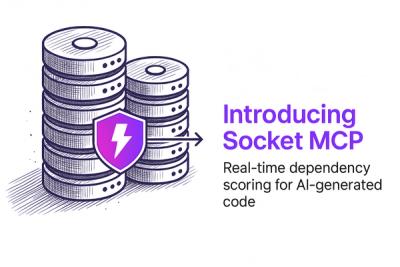
Product
Secure Your AI-Generated Code with Socket MCP
Socket MCP brings real-time security checks to AI-generated code, helping developers catch risky dependencies before they enter the codebase.
Ruby API v3 Client files and sample apps
See the Hubspot API docs.
gem install 'hubspot-api-client'
Please follow the installation procedure and then run the following code:
# Load the gem
require 'hubspot-api-client'
# Setup client
client = Hubspot::Client.new(access_token: 'your_access_token')
# Get contacts
contacts = client.crm.contacts.basic_api.get_page
Please, note that hapikey is no longer supported after v13.1.0. You can get more info about hapikey sunset here. Also, plese, visit a migration guide if you need help with a migration process.
get_all method is available for all objects (Companies, Contacts, Deals and etc).
client = Hubspot::Client.new(access_token: 'your_oauth2_access_token')
all_contacts = client.crm.contacts.basic_api.get_all
You'll need to create a private app to get your access token or you can obtain OAuth2 access token.
Please note that pagination is used under the hood to get all results.
do_search method is available for all objects (Companies, Contacts, Deals and etc).
Only 3 FilterGroups with max 3 Filters are supported.
It is possible to access the hubspot request method directly, it could be handy if client doesn't have implementation for some endpoint yet. Exposed request method benefits by having all configured client params.
client.api_request({
"method": "PUT",
"path": "/some/api/not/wrapped/yet",
"body": {"key": "value"}
})
- "method": string, # Http method (e.g.: GET, POST, etc). Default value GET
"path": string, # URL path (e.g.: '/crm/v3/objects/contacts'). Optional
"headers": array, # Http headers. Optional.
"body": mixed, # Request body (if defaultJson set body will be transforted to json string).Optional.
"auth_type": (access_token, hapikey, developer_api_key), # Auth type. if it isn't set it will use access_token or hapikey. Default value is non empty auth_type.
"auth_value": string, # The corresponding value for the auth_type.
"base_url": string, # Base URL. Default value 'https://api.hubapi.com'.
"qs": array, # Query parameters. Optional.
"default_json": bool, # Default Json. if it is set to true it add to headers [ 'Content-Type' => 'application/json', 'Accept' => 'application/json, */*;q=0.8',]
GET requestrequire 'hubspot-api-client'
client = Hubspot::Client.new(access_token: 'your_access_token')
options = {
method: "GET",
path: "/crm/v3/objects/contacts",
qs: {
limit: 1,
properties: ["email", "last_activity_date"]
}
}
contacts = client.api_request(options)
p JSON.parse(contacts.body)
POST requestrequire 'hubspot-api-client'
client = Hubspot::Client.new(access_token: 'your_access_token')
options = {
method: "POST",
path: "/crm/v3/objects/contacts",
body: {
"properties": {
"email": "some_email@some.com",
"lastname": "some_last_name"
}
}
}
contacts = client.api_request(options)
p JSON.parse(contacts.body)
require 'hubspot-api-client'
require 'date'
api_client = Hubspot::Client.new(access_token: "YOUR_ACCESS_TOKEN")
# timestamp in milliseconds
timestamp = (DateTime.parse("XXXX-XX-XXTXX:XX:XX.XXXZ").to_time.to_f * 1000).to_i.to_s
body = {
"filterGroups":
[
{
"filters":[
{
"value": timestamp,
"propertyName":"lastmodifieddate",
"operator":"EQ"
}
]
}
]
}
api_response = api_client.crm.contacts.search_api.do_search(
body: body
)
puts api_response
client = Hubspot::Client.new(access_token: 'your_oauth2_access_token')
labels = {
singular: 'My object',
plural: 'My objects'
}
option = {
label: 'Option A',
value: 'A',
description: 'Choice number one',
display_order: 1,
hidden: false
}
property = {
name: 'property001',
label: 'My object property',
group_name: 'my_object_information',
options: [option],
display_order: 2,
type: 'enumeration',
field_type: 'select'
}
body = {
labels: labels,
required_properties: ['property001'],
searchable_properties: [],
primary_display_property: 'property001',
secondary_display_properties: [],
properties: [property],
associated_objects: ['CONTACT'],
name: 'my_object'
}
api_response = client.crm.schemas.core_api.create(body: body)
require 'hubspot-api-client'
client = Hubspot::Client.new(access_token: 'your_access_token')
contacts = client.crm.contacts.basic_api.get_page { |error| error.message }
Available params:
require 'hubspot-api-client'
# Set handlers of statuses you want to handle
retry_config = {
500..530 => { max_retries: 2, seconds_delay: 2 },
400 => { max_retries: 3, seconds_delay: 3 }
}
client = Hubspot::Client.new(access_token: 'your_access_token')
contacts = client.crm.contacts.basic_api.get_page(retry: retry_config) { |error| error.code }
Please, take a look at our Sample apps
FAQs
Unknown package
We found that hubspot-api-client demonstrated a healthy version release cadence and project activity because the last version was released less than a year ago. It has 1 open source maintainer collaborating on the project.
Did you know?

Socket for GitHub automatically highlights issues in each pull request and monitors the health of all your open source dependencies. Discover the contents of your packages and block harmful activity before you install or update your dependencies.

Product
Socket MCP brings real-time security checks to AI-generated code, helping developers catch risky dependencies before they enter the codebase.

Security News
As vulnerability data bottlenecks grow, the federal government is formally investigating NIST’s handling of the National Vulnerability Database.

Research
Security News
Socket’s Threat Research Team has uncovered 60 npm packages using post-install scripts to silently exfiltrate hostnames, IP addresses, DNS servers, and user directories to a Discord-controlled endpoint.